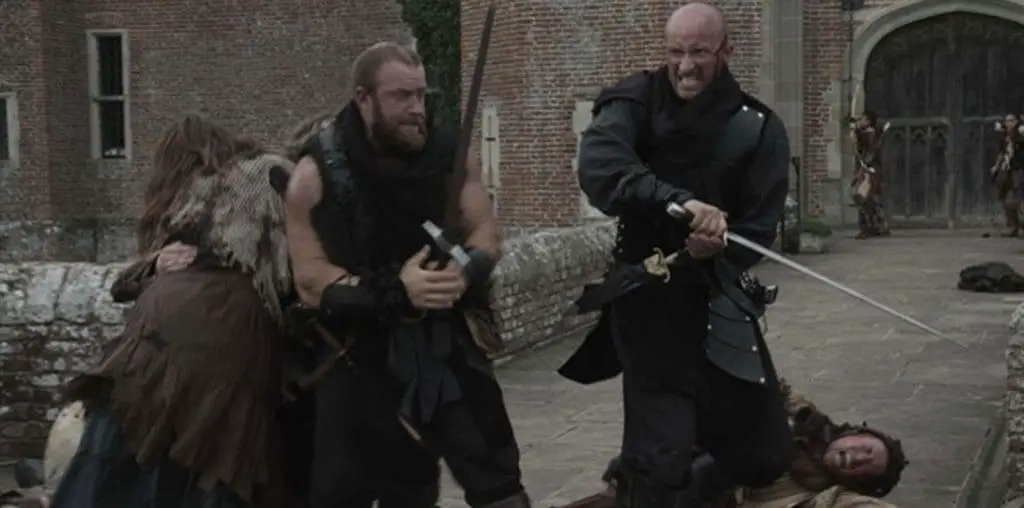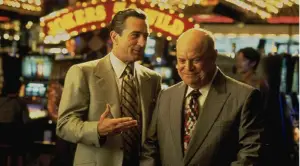
Not to make you feel old, but Martin Scorsese’s classic, Casino, is going to be 30 next year. And, boy, hasn’t it aged well? Widely regarded as a cinematic classic, the film stands as a testament to the director’s mastery of the gangster genre and his uncanny knack for shining a light on the complexities and allure of power, greed, and betrayal.
First released in 1995, the crime epic reunites the legendary director with frequent collaborator and double Oscar winner, Robert De Niro, in a story about the rise – and fall – of a Las Vegas empire.
Cast and Crew
With Scorsese at the helm, Casino also boasts a typical impressive cast led by Robert De Niro as Sam “Ace” Rothstein, a gambling expert tasked with overseeing a mob-controlled casino in Las Vegas.
Opposite him is Sharon Stone as Ginger McKenna, Ace’s stunning and equally alluring wife whose troubled past and addiction to risk threaten to unravel everything. Stone delivers a career-defining performance which rightfully earned her an Oscar nomination for her portrayal of the complex and volatile Ginger.
And, who could forget Joe Pesci, who rounds out the main cast as Nicky Santoro, Ace’s childhood friend turned mob enforcer whose brutal methods sow the seeds of destruction?
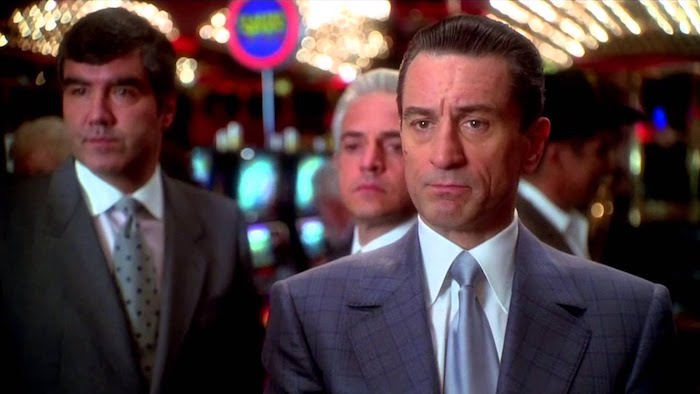
Plot
Set against the glitzy backdrop of 1970s Las Vegas, Casino follows Ace Rothstein’s journey as he transforms a once-struggling casino into a lucrative enterprise. However, Ace’s success attracts the attention of the mob, leading to a partnership that soon spirals out of control.
As Ace navigates the treacherous waters of casino politics and personal relationships, he finds himself caught between loyalty to his friends and the looming threat of betrayal. The film’s narrative is a gripping exploration of ambition, corruption, and the price of power, culminating in a tragic downfall fueled by greed and hubris.
The film showcases a pretty diverse range of gambling activities that defined the era. For example, there’s blackjack, where players need a hand totaling close to 21; craps, the high-energy dice game; roulette, the famous game of chance, and, of course, slots (pokies), which offer players the chance to win by simply aligning matching symbols.
Each of these gambling games is just as popular today, with casino expert, Vlad Grindu, arguing that playing pokies, in particular, are gaining attention due to their “massive jackpots with small bets and a bit of luck” (source: https://www.techopedia.com/gambling/australia/online-pokies-real-money). Assuming you’re not part of a nefarious Chicago mafia mob, you can take advantage of welcome bonuses, free spins, and even quick withdrawals when playing pokies in 2024.
But on top of portraying the excitement of these games, the film Casino delves into the behind-the-scenes operations of casinos, revealing how they maintain favorable odds and handle cheating, giving watchers a glimpse into the meticulous workings of the casino gambling industry.
Gritty Realism & Themes
Scorsese infuses Casino with his signature style, with ease capturing the gritty reality of organized crime and the seduction of the Las Vegas dream. The film’s portrayal of violence, profanity, and moral ambiguity is unflinching with the viewer sucked into a world where every decision carries life-altering consequences.
At its core, Casino is a meditation on themes of greed, addiction, and the corrupting influence of power. Ace Rothstein’s relentless pursuit of success ultimately leads to his downfall, showing how dangerous unchecked ambition can be. Perhaps most interestingly, the film weaves through the fragile balance between order and chaos, as characters grapple with the consequences of their actions in a world where morality is often overshadowed by self-interest.
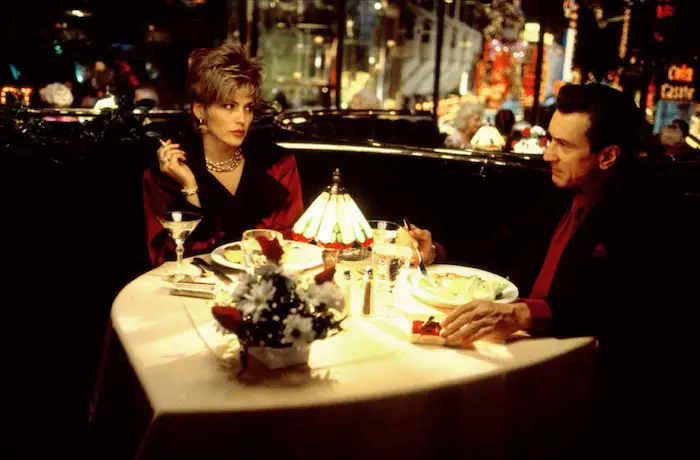
Cinematography & Symbolism
Scorsese employs a variety of visual motifs and symbols throughout Casino to convey deeper layers of meaning. Mirrors, for example, serve as a recurring motif that reflects the duplicity and hidden agendas of the characters, while close-ups of objects like dice and money underscore the film’s themes of obsession and control.
Editing
You could argue that the film’s editing style is every bit as dynamic as its subject matter, thanks to jump cuts and slow-motion sequences which add to the tension and drama throughout. Fast-paced cuts during the casino gambling sequences mirror the frenetic energy of the casino floor, while slow-motion shots accentuate key moments of drama and suspense. These editing techniques serve to heighten the film’s emotional impact, drawing viewers deeper into the psychological complexities of its characters and their relationships.
Soundtrack
The film’s soundtrack is a tapestry of classic rock, blues, and pop hits from the 1970s, evoking the era’s vibrant energy and hedonistic spirit. From the iconic opening sequence set to the tune of The Animals’ “House of the Rising Sun” to the climactic moments punctuated by the Rolling Stones’ “Can’t You Hear Me Knocking,” the music serves as a powerful backdrop to Ace Rothstein’s tumultuous journey.
Awards and Recognition
While Casino didn’t sweep the awards circuit, Sharon Stone’s performance garnered huge and deserved acclaim, earning her an Academy Award nomination for Best Actress. The film’s direction, editing, and costume design also received praise from critics and audiences alike – not that these accolades were required to solidify the film’s status as a classic in the crime genre.
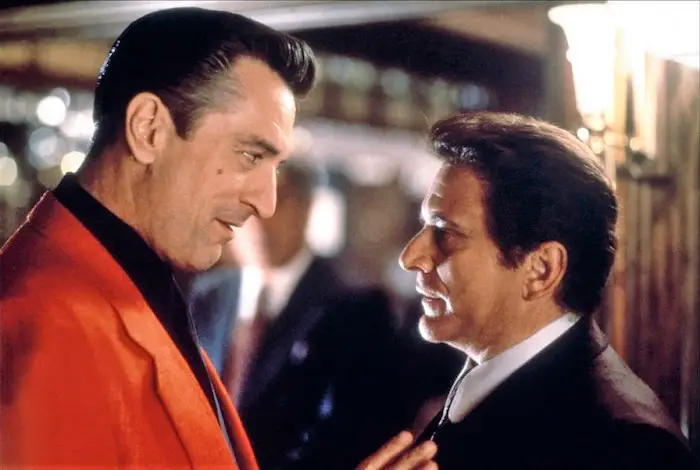
Critical Reception
Upon its release in ’95, Casino received praise from critics for its gripping performances, stylish direction, and evocative visual imagery. However, some reviewers noted the film’s excessive violence and uneven pacing as potential drawbacks. Despite these criticisms, Casino has endured well into the 21st century.
Box Office
At the box office, Casino performed well, hitting $116.1 million which undoubtedly helped to further solidify Scorsese’s reputation as a master filmmaker, with his place in cinematic history now undeniable. While it may not have achieved the same level of commercial success as some of his other works, it’s the film’s continuing popularity that’s ensured its status as a classic in the pantheon of crime cinema.
Final Thoughts
Casino continues to resonate with audiences today and has inspired countless Hollywood filmmakers in its wake, and has influenced the overall trajectory of the crime genre. Certainly no mean feat. Its exploration of the dark, seedy underbelly of Las Vegas and the human cost of ambition, morality, power, and the dangerous pursuit of the American Dream.

